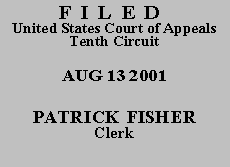

| UNITED STATES OF AMERICA,
Plaintiff-Appellee, v. ALLEN CHARLES DAY, Defendant-Appellant. |
|
Allen Charles Day appeals his convictions for manufacturing and distributing methamphetamine, as well as conspiracy to do the same, in violation of, respectively, 21 U.S.C. § 841(d)(2) and 21 U.S.C. § 846. We affirm.
During the investigation of a large-scale methamphetamine operation in Oklahoma City, the Federal Bureau of Investigation learned of the possible involvement of Mr. Day. Two agents interviewed Mr. Day, who at the time was incarcerated on unrelated charges in an Oklahoma county jail. Mr. Day made inculpatory statements during the interview. He later repeated the statements in testimony before the grand jury. In a pretrial motion, Mr. Day moved to exclude the statements on the ground that they were involuntary. Following a hearing, the trial court denied the motion to suppress. Mr. Day was convicted by a jury and sentenced to a lengthy prison term. He appeals, challenging only the denial of his motion to suppress.
We review the voluntariness of Mr. Days's inculpatory statements de novo, although the trial court's rulings regarding subsidiary factual questions are subject to review under the clearly erroneous standard. United States v. Short, 947 F.2d 1445, 1449 (10th Cir. 1991).
A defendant's due process rights under the Fourteenth and Fifth Amendments are violated if his conviction rests upon an involuntary confession. Jackson v. Denno, 378 U.S. 368, 376 (1964). "A defendant's confession is involuntary if the government's conduct causes the defendant's will to be overborne and his capacity for self-determination critically impaired." United States v. McCullah, 76 F.3d 1087, 1101 (10th Cir. 1996) (quotation omitted). "In determining whether the defendant's will was overborne in a particular case, the court examines the totality of all the surrounding circumstancesboth the characteristics of the accused and the details of the interrogation." Id.
Relevant factors to be considered include "the age, intelligence, and education of the suspect; the length of the detention and questioning; the use or threat of physical punishment; whether Miranda safeguards were administered; the accused's physical and mental characteristics; and the location of the interrogation." United States v. Perdue, 8 F.3d 1455, 1466 (10th Cir. 1993). In addition, the court must "consider the conduct of the police officers." Id.
Our independent review of the record establishes that Mr. Day's statements were voluntarily given. He was advised of his constitutional rights before he spoke to the FBI and was re-advised of those same rights before his grand jury testimony; he signed separate written statements waiving his rights prior to each event. The interview with FBI agents took place not in his jail cell but in the sheriff's office. The door to the sheriff's office was open, the thirty-three year old Mr. Day was not handcuffed during the hour and a half interview, and the agents were not visibly armed. Mr. Day does not claim that he was physically coerced or otherwise threatened in any manner by the agents.
The most Mr. Day alleges is that the FBI agents made an implied promise of immunity to him, one that amounted to an unlawful "psychological ploy" given his limited educational background. Appellant Br. at 6. He was told, he claims, that his cooperation may dissuade prosecutors from charging him with any crimes. He argues that this "gave him false hope that if he talked, he would not be prosecuted." Id. at 5. This may be so, but we cannot agree that the agents' routine comments violated the constitution.
According to testimony provided at the suppression hearing, the agents told Mr. Day, truthfully, that the contents of his interview would be provided to the prosecuting attorney's office, and that, equally truthfully, any decision to charge him with crimes resulting from his participation in the drug ring rested exclusively with the prosecutors assigned to the case. The agents further told him that, as a result of the information he provided, it was possible that he would not be charged with any crimes. This too is true. But, in the absence of some indication of coercion, neither it nor any other statement made by the agents runs afoul of the Fifth Amendment. See United States v. Nguyen, 155 F.3d 1219, 1223 (10th Cir. 1998) (relying on agent's testimony that he made no offers of leniency and holding that "a statement to inform the prosecutor of a defendant's cooperation without any other indications of coercion does not constitute a promise of leniency").
The judgment of the United States District Court for the Western District of Oklahoma is AFFIRMED.
Entered for the Court
Circuit Judge
*. This order and judgment is not binding precedent, except under the doctrines of law of the case, res judicata, and collateral estoppel. The court generally disfavors the citation of orders and judgments; nevertheless, an order and judgment may be cited under the terms and conditions of 10th Cir. R. 36.3.